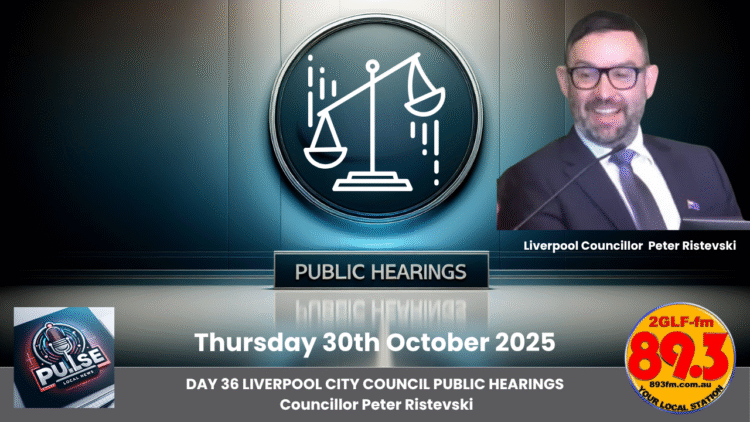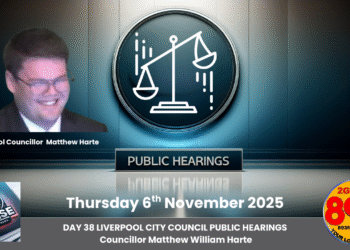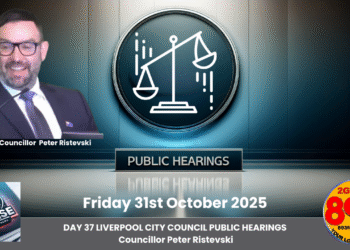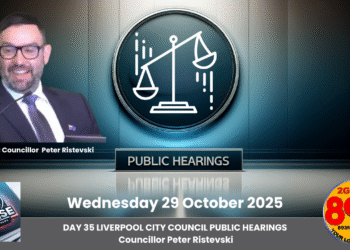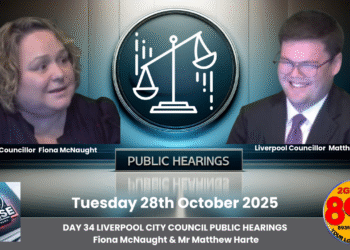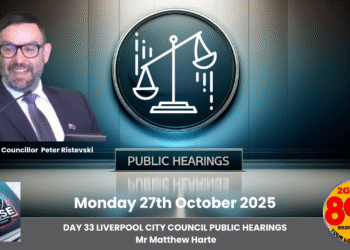Councillor Peter Ristevski’s Testimony
- Public Comment and Robust Debate: Councillor Ristevski, under oath from Monday, reiterated his commitment to robust public debate on council issues via social media and other platforms, acknowledging limitations outlined in the code of conduct and the “Free Speech in Local Government in New South Wales” guideline (June 2025). He confirmed a shift in approach post-self-audit and education to observe these limits, particularly when commenting on the mayor or other councillors.
- Limitations Involving Staff: The inquiry focused on limitations when public comments involve council staff, referencing the guideline’s prohibition on personal attacks on staff in public forums (including social media) under clause 7.6(h) of the Model Code of Conduct. Ristevski agreed staff are restricted from engaging in public rebuttals or debates, unlike councillors, due to their role constraints. Specific code of conduct complaints related to staff were discussed in a private session (10:29 AM to 10:49 AM).
- Councillor-Staff Interaction and Media Policy: Ristevski was questioned about correspondence from May 2025 regarding his request to post a video on the Liverpool City Council Facebook page about the Aerotropolis conference in Hong Kong. After being denied by a staff member (citing the media policy where the mayor or delegated councillors are spokespersons), he escalated the issue to the CEO, Jason Breton. In his email, he made a critical personal comment about the staff member, stating they were “not a fit and proper person to work at the council,” which Breton advised him to refrain from. Ristevski expressed concern over Breton copying others into the email chain, viewing it as a breach of privacy, and justified his comment by alleging nepotism in the staff member’s hiring process, though he acknowledged the staff member was performing their job.
- Work Health and Safety Obligations: The inquiry explored Ristevski’s understanding of work health and safety (WHS) obligations, particularly psychosocial hazards (e.g., stress, bullying, depression) that can arise from public or internal comments about staff. As an employer in his professional life, he was familiar with WHS laws and had recently undergone training (within the last month), but he admitted limited prior awareness of psychosocial hazards in a council context. He noted no specific discussions or training on this topic at council before the recent session, and only fully grasped the concept—linking it to mental health—after training.
Matters Arising of Interest to Ratepayers: Are Ratepayers Getting Good Value for Money?
Ratepayers of Liverpool City Council are concerned about whether their contributions result in effective governance, respectful interactions, and a safe working environment for council staff. The following matters from Day 36 of the inquiry highlight areas where value for money is in question:
- Governance and Professional Conduct:
- Inappropriate Comments on Staff: Councillor Ristevski’s critical personal comment about a staff member being “not a fit and proper person” in an email to the CEO, despite the staff member adhering to policy, raises concerns about professional conduct. Such remarks, especially when unfounded or personal, can undermine staff morale and council cohesion. Ratepayers may question if their money funds a governing body that respects staff, or if personal grievances waste resources on conflict resolution.
- Escalation and Privacy Issues: Ristevski’s escalation of a routine media policy issue to the CEO, coupled with his concern over the CEO copying others into the email chain, suggests potential inefficiencies and mistrust in communication protocols. If ratepayer-funded time is spent on unnecessary escalations or disputes over privacy rather than community issues, the value of governance diminishes.
- Training and Awareness of Obligations:
- Limited Awareness of Psychosocial Hazards: Ristevski’s lack of prior understanding of psychosocial hazards in a council context—despite WHS training in his professional life—and the absence of council-specific discussions on this topic until recently, indicates a training gap. If councillors are unaware of how their public comments can impact staff mental health, ratepayers may not receive value as potential hazards could lead to staff leave, reduced productivity, or legal issues, all costing resources.
- Reactive Rather Than Proactive Learning: His understanding of WHS obligations and psychosocial risks only solidified after recent training, suggesting a reactive approach to critical governance responsibilities. Ratepayers may question the value of training programs if they fail to proactively equip councillors to prevent harm, risking costly consequences that could have been avoided with earlier education.
- Transparency and Community Trust:
- Adherence to Media Policy: Ristevski’s dissatisfaction with the media policy—where the mayor or delegates are designated spokespersons—and his push for personal visibility on council platforms (e.g., Aerotropolis video post) raises questions about adherence to established roles. If ratepayers perceive councillors prioritizing personal agendas over policy, trust in fair representation erodes, impacting the perceived value of their contributions.
- Impact on Staff and Public Perception: Public or internal criticism of staff, as seen in Ristevski’s email, risks damaging the council’s reputation and creating a hostile work environment. Ratepayers may wonder if their money supports a council that fosters a positive, professional culture, or if personal comments by councillors detract from community-focused governance, reducing trust and value.
Conclusion
The Day 36 proceedings of the Public Inquiry into Liverpool City Council reveal significant challenges in professional conduct, training on critical obligations, and transparency that affect whether ratepayers are receiving good value for their money. Councillor Ristevski’s inappropriate personal comment about a staff member and escalation of routine issues suggest a lack of respect and efficiency in governance interactions, diverting resources from community priorities. Limited prior awareness of psychosocial hazards and reactive learning highlight training deficiencies that risk staff well-being and potential costs. Additionally, adherence to media policies and the impact of personal criticisms on public trust raise concerns about representation. Ratepayers deserve assurance that their contributions fund a respectful, well-trained, and transparent council, yet evidence from this hearing indicates areas where value for money remains uncertain. As the inquiry progresses, these issues warrant scrutiny to ensure improvements at Liverpool City Council.









